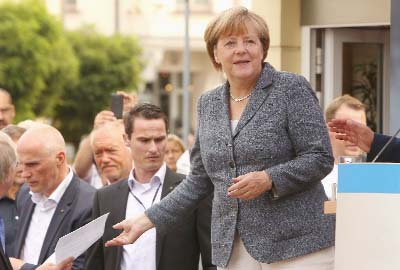
AFP, Schwerin (Germany) :Chancellor Angela Merkel’s party braced for a backlash at state polls Sunday, while anti-migrant populists are poised for major gains a year after the German leader opened the borders to refugees.Around 1.33 million voters are electing a new regional parliament for the northeastern state of Mecklenburg-Western Pomerania, which is also home to Merkel’s constituency Stralsund.The polls come exactly a year after the German leader made the momentous decision to let in tens of thousands of Syrian and other migrants marooned in eastern European countries.Although she won praise at first, the mood has since turned, giving way to fears over how Europe’s biggest economy will manage to integrate the million people who arrived last year alone.Her decision has left her increasingly isolated in Europe, and exposed her to heavy criticism at home, including from her own conservative allies.Right-wing populist Alternative for Germany (AfD), which has campaigned heavily against Merkel’s liberal refugee policy, is expected to record strong support at the polls.Opinion polls suggest that it might even unseat the German leader’s party CDU from second place after the Social Democrats.In the sprawling farming and coastal state of Mecklenburg-Western Pomerania-Germany’s poorest and least populous-the issue of refugees and integration has also become the deciding factor for one in three voters.”I am voting AfD. The main reason is the question over asylum-seekers,” said a pensioner and former teacher who declined to be named.”A million refugees have come here. There is money for them, but no money to bring pensions in the east to the same levels as those of the west,” he said, referring to the lower retirement payments that residents of former Communist states receive compared to those in the west.

